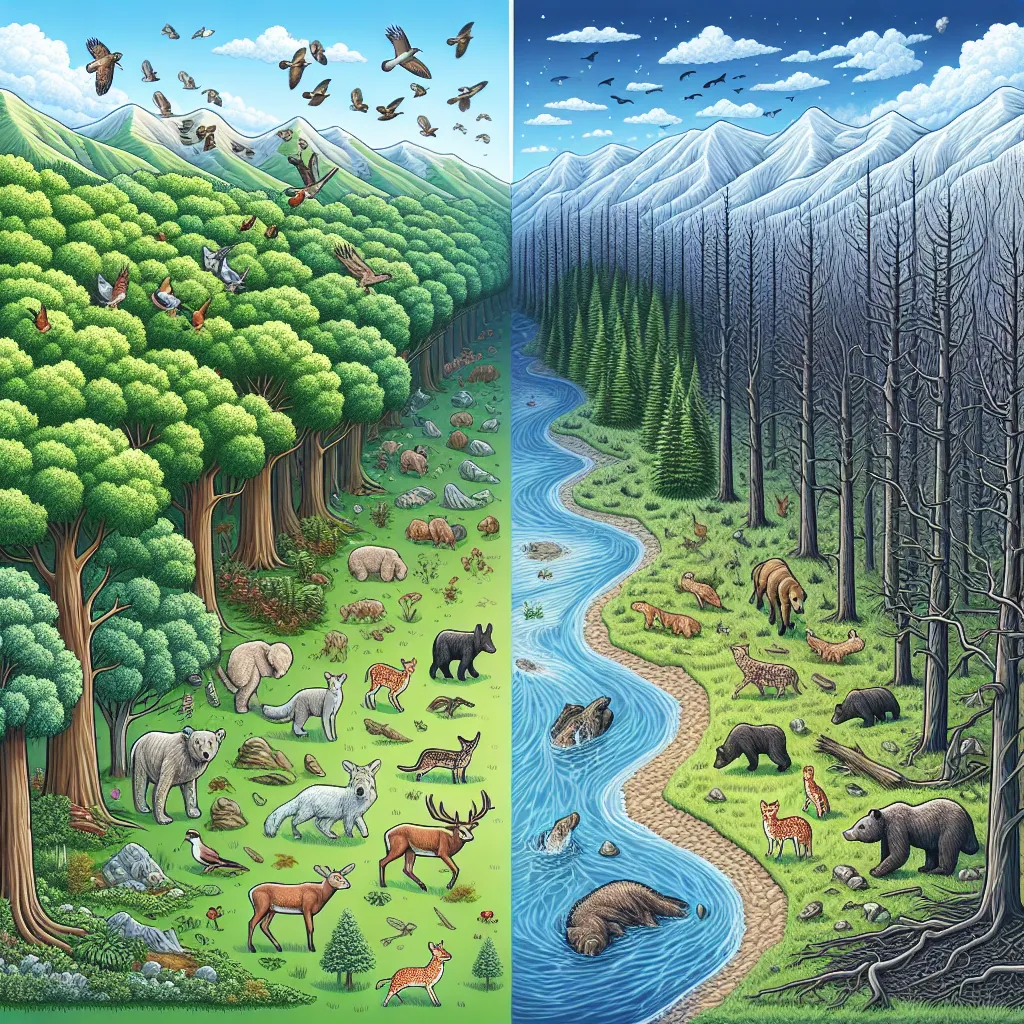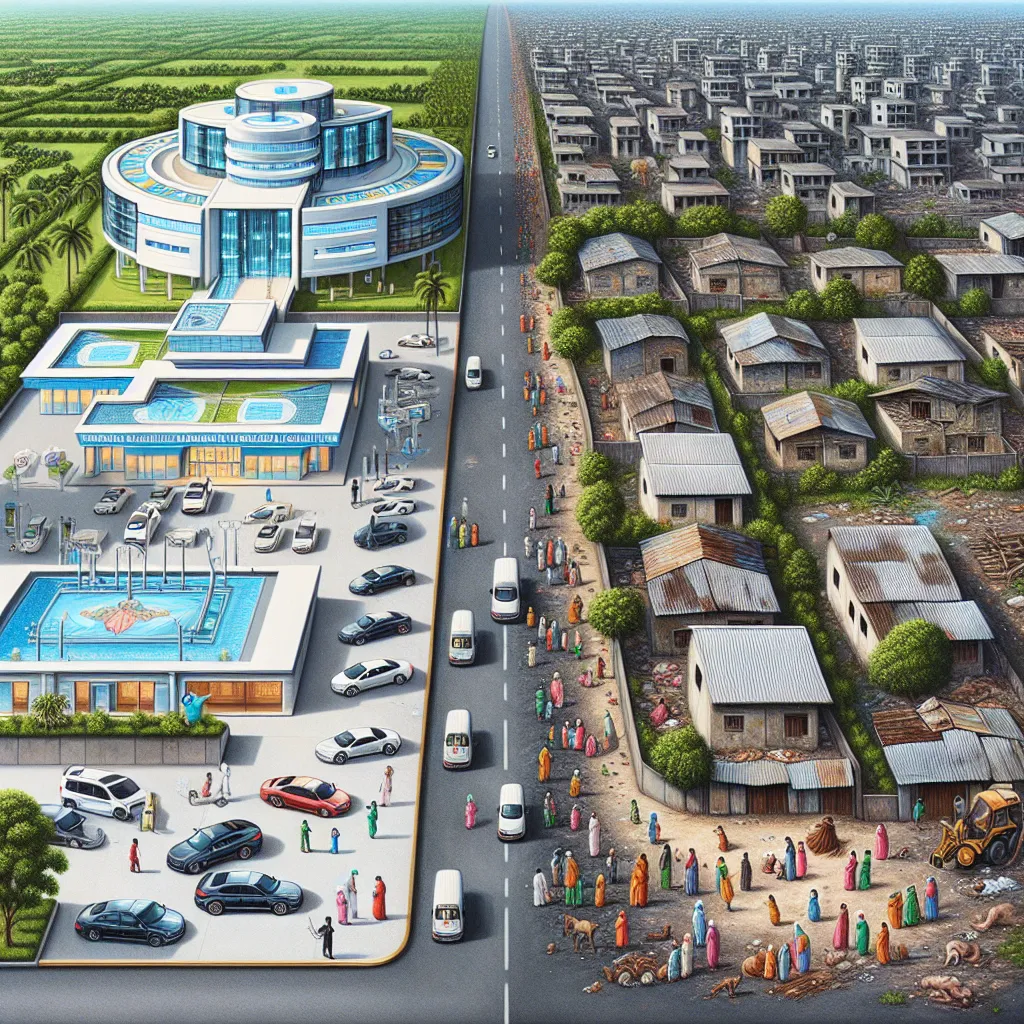Global warming and its effects on ecosystems have become increasingly prevalent topics in IELTS Writing Task 2. This theme has appeared frequently in recent years and is likely to continue being a popular subject for examination. Let’s explore a relevant question that has been observed in past IELTS tests and analyze how to approach it effectively.
Nội dung bài viết
Some people believe that the Earth is being harmed by human activity. Others feel that human activity makes the Earth a better place to live. What is your opinion? Use specific reasons and examples to support your answer.
Analyzing the Question
This question presents two contrasting viewpoints about human impact on the Earth:
- Human activity is harming the Earth
- Human activity is improving the Earth
The task requires you to:
- Choose a stance or consider both perspectives
- Provide specific reasons and examples to support your opinion
- Discuss the impact of human activities on the Earth’s ecosystems
Sample Essay 1 (Band 8-9)
Human activity has undoubtedly transformed our planet, but whether this change has been predominantly positive or negative is a subject of intense debate. While I acknowledge that human innovations have improved living conditions for many, I firmly believe that the overall impact of human activity on Earth has been detrimental, particularly to its ecosystems.
The primary reason for my stance is the undeniable evidence of environmental degradation caused by human actions. Deforestation, for instance, has led to the destruction of vast areas of natural habitats, causing a significant loss of biodiversity. The Amazon rainforest, often called the “lungs of the Earth,” has lost approximately 17% of its forest cover in the last 50 years due to human activities such as logging and agriculture. This loss not only affects local ecosystems but also contributes to global climate change by reducing the Earth’s capacity to absorb carbon dioxide.
Moreover, industrial pollution has severely impacted both terrestrial and aquatic ecosystems. The release of harmful chemicals and greenhouse gases into the atmosphere has led to phenomena such as acid rain and global warming. The Great Barrier Reef, for example, has experienced extensive coral bleaching due to rising ocean temperatures, threatening the survival of countless marine species. These examples clearly illustrate how human activities are causing irreversible damage to delicate ecosystems.
On the other hand, proponents of the opposing view might argue that human ingenuity has led to advancements that have improved life on Earth. Technological innovations in agriculture have increased food production, medical breakthroughs have extended life expectancy, and communication technologies have connected people across the globe. While these achievements are commendable, they often come at a significant environmental cost. Intensive farming practices deplete soil nutrients and pollute water sources, and the production of electronic devices contributes to e-waste and resource depletion.
In conclusion, while human activity has undoubtedly brought about some improvements in living conditions, the overall impact on the Earth’s ecosystems has been overwhelmingly negative. The scale of environmental destruction caused by human actions far outweighs the benefits, threatening the delicate balance of our planet’s ecosystems. It is crucial that we recognize this impact and take immediate action to mitigate the harm we are causing to ensure a sustainable future for all life on Earth.
(Word count: 368)
 Impact of global warming on ecosystems
Impact of global warming on ecosystems
Sample Essay 2 (Band 6-7)
In recent years, there has been a lot of discussion about how humans affect the Earth. Some people think we are harming the planet, while others believe we are making it better. In my opinion, human activities have both positive and negative impacts on the Earth, but the negative effects are more significant.
One of the main reasons I think human activity is harmful to the Earth is pollution. Factories and cars release a lot of harmful gases into the air, which causes air pollution and contributes to global warming. For example, in big cities like Beijing, the air quality is often very poor, and people have to wear masks to protect themselves. This pollution not only affects humans but also harms plants and animals.
Another problem caused by humans is deforestation. Many forests are being cut down to make space for farming or to build houses and roads. This destroys the homes of many animals and plants. In countries like Brazil, large parts of the Amazon rainforest have been destroyed, which is bad for the environment and the animals that live there.
However, it’s also true that humans have made some improvements to the Earth. Technology has helped us to produce more food, which means fewer people go hungry. We have also developed medicines that help people live longer and healthier lives. In some places, people are working to clean up the environment and protect endangered species.
Despite these positive aspects, I believe the damage we are doing to the Earth is greater than the improvements we are making. The problems of pollution, deforestation, and climate change are very serious and affect the whole planet. If we don’t change our ways, we might cause permanent damage to the Earth.
In conclusion, while humans have made some positive changes to the Earth, the negative impacts of our activities are more significant. We need to find ways to reduce the harm we are causing and protect the environment for future generations.
(Word count: 323)
Key Points to Consider When Writing
-
Vocabulary: Use a range of vocabulary related to the environment and human impact. For higher band scores, incorporate more sophisticated terms and phrases.
Band 8-9 vocabulary:
- Biodiversity
- Ecosystem
- Environmental degradation
- Irreversible damage
- Mitigation
Band 6-7 vocabulary:
- Pollution
- Global warming
- Deforestation
- Endangered species
- Climate change
-
Grammar: Employ a variety of sentence structures and tenses to demonstrate your language proficiency.
Band 8-9 grammar:
- Use of complex sentences: “While I acknowledge that human innovations have improved living conditions for many, I firmly believe that the overall impact of human activity on Earth has been detrimental, particularly to its ecosystems.”
- Advanced conditional structures: “If we don’t address these issues urgently, we may face irreversible consequences.”
Band 6-7 grammar:
- Mix of simple and compound sentences: “Factories and cars release a lot of harmful gases into the air, which causes air pollution and contributes to global warming.”
- Basic conditional structures: “If we don’t change our ways, we might cause permanent damage to the Earth.”
-
Structure: Organize your essay logically with clear paragraphs for introduction, body, and conclusion. Use cohesive devices to link ideas and paragraphs seamlessly.
-
Examples: Provide specific, relevant examples to support your arguments. For higher band scores, include more detailed and less common examples.
-
Balance: Consider both sides of the argument, even if you have a clear stance. This demonstrates critical thinking and a nuanced understanding of the topic.
Challenging Vocabulary to Remember
- Ecosystem (noun) /ˈiːkəʊsɪstəm/ – a biological community of interacting organisms and their physical environment
- Biodiversity (noun) /ˌbaɪəʊdaɪˈvɜːsəti/ – the variety of plant and animal life in the world or in a particular habitat
- Deforestation (noun) /diːˌfɒrɪˈsteɪʃn/ – the action of clearing a wide area of trees
- Mitigation (noun) /ˌmɪtɪˈɡeɪʃn/ – the action of reducing the severity, seriousness, or painfulness of something
- Degradation (noun) /ˌdeɡrəˈdeɪʃn/ – the process in which the beauty or quality of something is destroyed or spoiled
- Irreversible (adjective) /ˌɪrɪˈvɜːsəbl/ – not able to be undone or altered
- Anthropogenic (adjective) /ˌænθrəpəˈdʒenɪk/ – originating in human activity
- Sustainability (noun) /səˌsteɪnəˈbɪləti/ – the ability to be maintained at a certain rate or level
- Resilience (noun) /rɪˈzɪliəns/ – the capacity to recover quickly from difficulties; toughness
- Conservation (noun) /ˌkɒnsəˈveɪʃn/ – preservation, protection, or restoration of the natural environment and of wildlife
Conclusion
The topic of human impact on the Earth and its ecosystems is a complex and crucial one, likely to appear in various forms in IELTS Writing Task 2. To excel in this task, it’s essential to demonstrate a nuanced understanding of the issue, provide specific examples, and use a range of vocabulary and grammatical structures appropriate to your target band score.
As you prepare for your IELTS exam, consider practicing with similar topics such as:
- The role of individuals vs. governments in environmental protection
- The balance between economic development and environmental conservation
- The impact of technological advancements on the environment
Remember, the key to improving your writing skills is consistent practice. Try writing your own essay on the topic discussed in this article and share it in the comments section below. This active practice will help you internalize the structures and vocabulary needed for a high-scoring IELTS essay.
For more insights on related topics, you might find these articles helpful:
- The Impact of Climate Change on Coastal Communities
- The Impact of Deforestation on Biodiversity
- Impact of Climate Change on Global Food Production
Good luck with your IELTS preparation!


